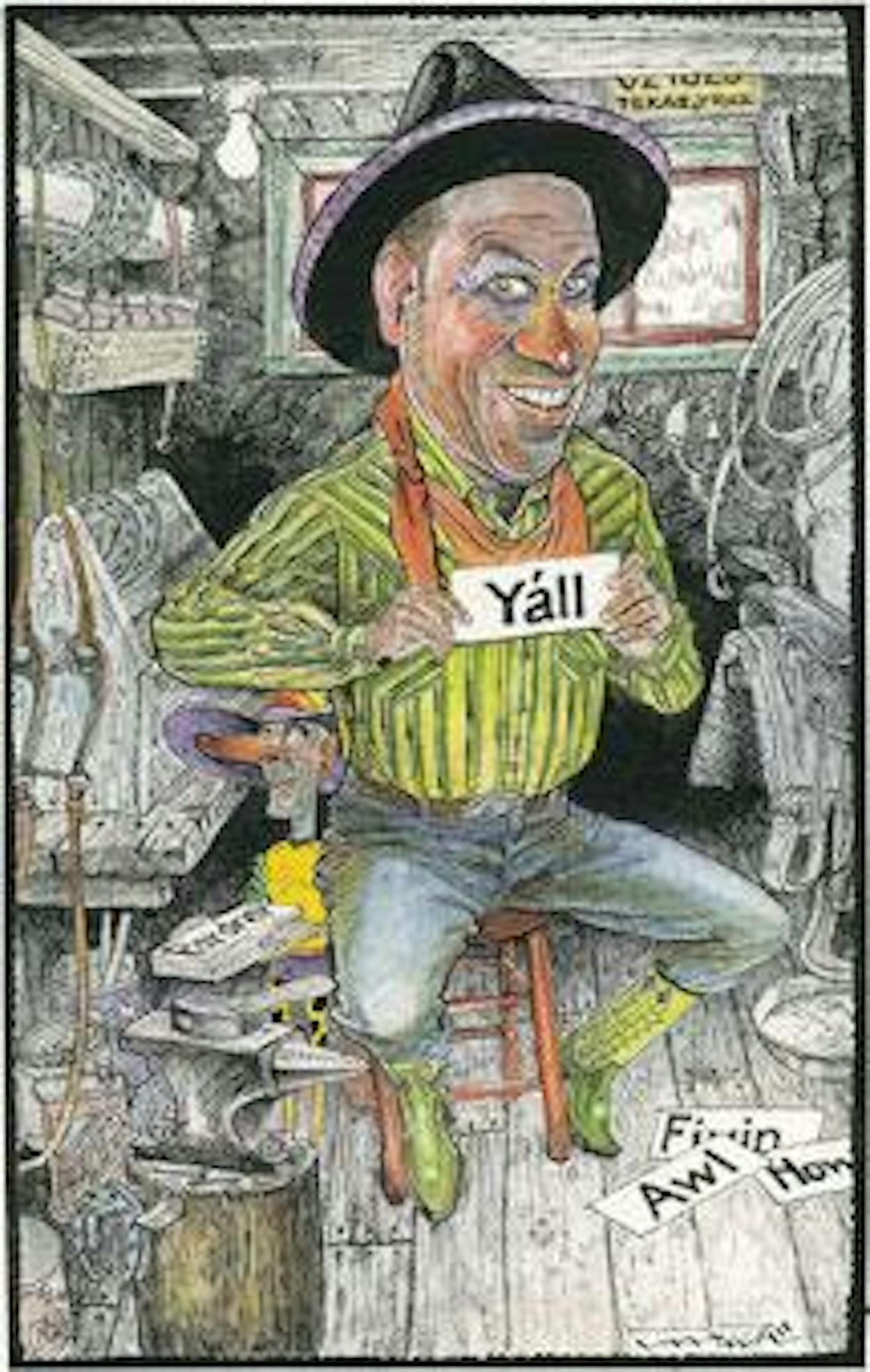Q: My husband originally hails from Wisconsin, and I was raised in Indiana. After three years in the Lone Star State, we have become comfortable throwing a “y’all” or “fixin’ to” into our conversations at home, but we still feel a little unqualified to use these expressions in public. At what point, if ever, can we boldly use them around native Texans?
Kathy Steinke
Tomball
February 2012
A: You are wise to be concerned about this. As with any patois, it is extremely rare for anyone other than the legitimate born-and-bred Texan to achieve complete mastery of the native tongue. But there are enough examples of zealous converts attaining near fluency (Ray Benson, Jerry Jeff Walker, George W. Bush) that you are encouraged to proceed—with caution. “Y’all” is generally accepted as a good introductory term for a would-be Texan undergoing the naturalization process. Its meaning is uncomplicated, it is easy to pronounce, and it is already in heavy usage throughout other regions of the country. Nevertheless, certain rules do apply. To begin with, the Texanist advocates a waiting period of no less than two years following relocation to Texas before initial public deployment of “y’all.” You and Mr. Steinke have met this requirement and may now move forth, but the Texanist advises you to stick to basic usage (e.g., “Excuse me, do y’all have a public restroom?”), as opposed to more complex forms such as the plural possessive (e.g., “Ma’am, where is y’all’s public restroom?”) or the exclamation (“There’s no public restroom? C’mon, y’all!”). These are best left to the natives. The Texanist further recommends advancing from “y’all” to “howdy” before attempting “fixin’ to” or, even more challenging, “yeehaw!” The fact that you have dedicated yourself to at-home immersion will no doubt speed the process.
Q: I recently began working with a few Canadians. After I did a favor for one of them, he said, “Thank you!” and I replied, “Uh-huh.” This led him to ask me why Texans think it’s okay to say “uh-huh” instead of “you’re welcome.” First, is it really all that rude, and second, is it just us Texans who say this?
Carrie
Denton
December 2008
A: In an informal setting, the casual “uh-huh” is acceptable in lieu of a more proper “you’re welcome.” Canadians are known the world over as an extraordinarily polite bunch: Politeness, in fact, is to Canada what friendliness is to Texas. It’s their thing. And here, likely, is both the origin of and answer to your Canadian friend’s query. He was being polite, and you were being friendly. If you want to engage him in an interesting discussion on regional customs, stomp on his toe, spit in his eye, or spill hot coffee in his lap and then ask him why he’s the one who is “sorry.”
Q: Please settle a $10 bet for me. I say “goat roper” is just another way of saying “cowboy,” but my friend says that a goat roper is more like a hick or a redneck. “Goat roper”: derogatory expression or term of endearment?
Name Withheld
December 2011
A: The first time the Texanist ever remembers hearing the phrase “goat roper,” it was shouted from the window of a speeding car and directed at a group of boys hanging out in front of dear old Temple High School’s dear old ag barns. The lewd hand gestures and squealing rubber that accompanied this particular drive-by signaled to the Texanist very clearly that it was meant as more of a taunt than a show of support for the hardworking members of the THS 4-H and FFA clubs. Term of endearment? The Texanist thinks not. A goat roper is not a genuine cowboy, but rather a wannabe cowboy who is relegated to the care (and roping) of goats. You are hereby ordered to remit one ten-spot to your buddy. Don’t believe the Texanist? Go find a cowboy (he’ll be the one with the horse between his legs) and call him a goat roper.
Q: Could you explain the nuances of distinction between a dance hall, a dive, and a honky-tonk?
H.B.
Monterrey, Mexico
May 2013
A: Back in his salad days, it would not have been at all unusual for the Texanist to patronize all three of the above-mentioned establishments in a single evening. For the purpose of answering your question, come along as we revisit a typical itinerary from one of those nights. We begin around eight or nine, as the Texanist, bathed and shined up, departs home for a small-to-medium-sized watering hole that offers cold beer, setups, a fine jukebox, a pool table or two, and possibly some lively shuffleboard action. The musical entertainment may come in the form of a band on a little stage or from the jukebox. Either way, proper dance floor or not, a smattering of folks are dancing. This joint is what one might refer to as a honky-tonk, but it is still too early for it to be jumping, and the Texanist is dropping in for only a few drinks before his next stop. You see, earlier that day, Wanda from the Sonic told him the Country Bumpkins would be playing down at the Wagon Train Dance Hall and he should come. She’d be there, and it’d be fun, she said. So off he goes for some dancing. Not everybody at the Wagon Train dances, but it is nevertheless a dance hall. The floor is large, with long tables around the edges and a bar where an old lady sells beer and potato chips. Wait, is that Wanda making out with Darrell over by the restrooms? Well, what do you know? Did the Texanist misunderstand? Does she give free Pickle-O’s and tater tots to all the guys? Though he doesn’t like to admit it, the Texanist is now feeling wounded and is no longer in the mood to dance. In fact, he thinks he’ll get out of here and stop by that little place on the frontage road with the flashing neon martini glass. Dark, dingy, and featuring year-round Christmas decorations, this is the sort of dive where the Texanist can happily feel sorry for himself without anyone bothering him. It smells funny in here. It’s pretty empty. The Texanist has a mai tai. And another. Suddenly he has a hankering for chili rice. Oh, Wanda! Why must men live to be tormented by women? This little trip down memory lane has been difficult for the Texanist, but he hopes it has helped to answer your question.
Q: I am a born-and-bred Austinite living in the big city of New York. To what degree should I expect the use of “y’all” to decrease my professional credibility up here?
Mark Moravits
New York, New York
November 2007
A: Times have changed, and usage of our unofficial state colloquialization in New York City nowadays should not soften your professional footing at all. So sure of this is the Texanist that if it does, he will jeopardize his own impeccable credibility by running naked through the district south of Houston (Street, that is) singing a song he will make up, titled “The Eyes of Y’all Are Upon Me.” Look out, Ivanka Trump!
Q: I was in Austin recently to attend the funeral of my aunt. After the service, we ate a fine Texas barbecue with brisket, chicken, sausage, and all the sides. As I’m a big eater, I really piled it on. My first cousin, whom I’d not seen in forty years, said that in Texas, when one has eaten one’s fill, the proper thing to do is throw up both hands in the air and holler “calf rope!” Please enlighten this native Georgia Bulldog as to why, exactly, this is?
Larry Rowell
Campbellsville, Kentucky
August 2009
A: The Texanist is sorry for your loss but glad you were able to partake in what sounds like a real good spread. In these parts, at the close of a notable feed, a person who finds himself plumb gut-busted might shout “calf rope!” to acknowledge that he cannot under any circumstance accommodate even one more bite, not even a little sausage end. Shouting “calf rope” is akin to crying uncle at the hands of a wrist-burn-dispensing foe. It is the eater’s white flag of surrender. As such, its deployment must be exquisitely timed. Too early and your tablemates will question your willpower, intestinal fortitude, and character. Too late and you may imperil your health and the carpet’s. It’s important to note, however, that when half-belched through bubbling barbecue sauce, a premature “calf rope” can always be rescinded if it was uttered before you were made aware of the presence of homemade peach cobbler.







